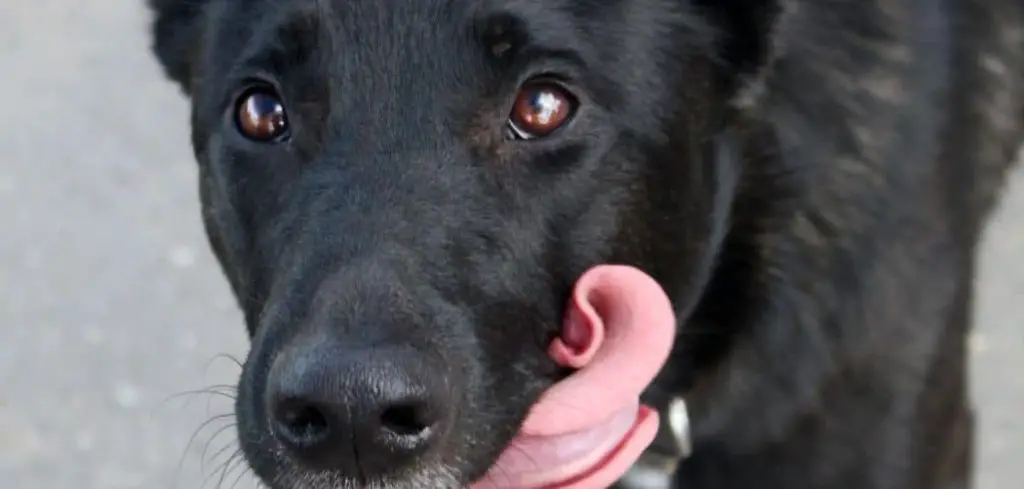Heavy or excessive breathing in dogs can be alarming for pet owners, especially when it happens suddenly or without clear reason.
While panting is normal after exercise or excitement, continuous or labored breathing can signal an underlying health issue that needs attention.
We outline the common causes of excessive breathing in dogs, what you can do at home, and when to seek veterinary help.
Dog Excessively Breathing — Why It Happens
Excessive breathing in dogs usually stems from overheating, respiratory illness, heart disease, pain, or anxiety. Dogs regulate their body temperature by panting, but when breathing becomes unusually heavy, rapid, or constant, it often means the body is under stress.
It may be something as simple as being too warm after play, or as serious as fluid in the lungs, heatstroke, or an underlying medical condition.

Dog Excessively Breathing: Common Causes
Heatstroke
Heatstroke is one of the most dangerous causes of excessive breathing in dogs. Since dogs cannot sweat like humans, they cool themselves by panting.
When their body temperature rises too high—usually from hot weather, vigorous exercise, or being left in an enclosed space—their breathing becomes rapid and strained.
Signs often include drooling, bright red gums, weakness, and collapse. Brachycephalic breeds like Bulldogs and Pugs are especially at risk. Heatstroke is a life-threatening emergency and requires immediate veterinary care.
Read more: Old Dog Breathing Heavy and Not Eating (Here’s why it happens)
Heart Disease
Heart conditions such as congestive heart failure can cause a dog to breathe excessively. When the heart struggles to pump efficiently, fluid can build up in the lungs or around the chest cavity, making it harder for the dog to get enough oxygen.
You may notice coughing, fatigue, or reluctance to exercise along with heavy breathing.
Heart disease tends to affect older dogs more often, but it can happen at any age. Left untreated, it can significantly reduce quality of life and lifespan.
Respiratory Infections
Conditions like pneumonia, kennel cough, or bronchitis can make dogs breathe more heavily as their bodies struggle to get enough oxygen. Excessive breathing may be accompanied by coughing, nasal discharge, wheezing, or fever.
Puppies, seniors, and dogs with compromised immune systems are more vulnerable to respiratory illness.
While some mild cases of kennel cough improve with rest, others require antibiotics and supportive care from a veterinarian.
Pain or Injury
Dogs often mask pain, but changes in breathing can be a subtle clue. If your dog is excessively breathing while resting, it may be a response to discomfort or pain from injury, arthritis, or internal issues.
Other signs may include restlessness, whining, or reluctance to move. Because dogs cannot tell us where it hurts, excessive breathing should always raise concern if it appears unrelated to exercise or temperature.
Anxiety and Stress
Just like humans, dogs can breathe heavily when anxious or stressed. Loud noises, fireworks, separation anxiety, or visits to the vet can trigger rapid breathing or panting.
This type of excessive breathing is usually short-lived and linked to a clear trigger.
However, if your dog frequently pants or breathes heavily during routine situations, it could signal chronic anxiety or a behavioral disorder that needs addressing.
Obesity
Overweight dogs are more prone to breathing difficulties. Excess body fat makes it harder for the lungs and heart to function properly, leading to heavier breathing even during light activity.
Obesity also increases the risk of other conditions like heart disease, arthritis, and diabetes—all of which can worsen breathing issues.
Weight management through diet and exercise is essential for improving breathing and overall health.
What to Do If Your Dog Is Excessively Breathing
If your dog is excessively breathing, start by assessing the situation. Did they just exercise or spend time in warm weather?
If so, help them cool down by moving them to a shaded or air-conditioned space and providing fresh water. Never place them directly in ice water, as this can shock the system.
Check for other signs like coughing, wheezing, pale gums, or lethargy. If your dog seems distressed, avoid overexertion and keep them calm. Anxiety-related breathing may improve with reassurance, quiet time, or calming aids recommended by your vet.
For overweight dogs, long-term care involves adjusting their diet, increasing exercise gradually, and consulting your veterinarian for safe weight-loss strategies.
Always monitor your dog closely. If the breathing does not return to normal quickly, or if it is accompanied by other concerning symptoms, a veterinary exam is necessary to rule out serious health conditions.
When to Call or Visit Your Vet
Excessive breathing should not be ignored, especially if it comes on suddenly or lasts longer than a few minutes. Call your vet immediately if your dog shows any of the following signs:
Labored or open-mouth breathing while at rest
Pale, blue, or gray gums or tongue
Collapse, weakness, or confusion
Persistent coughing or gagging
Excessive drooling, vomiting, or signs of heatstroke
Even if your dog’s symptoms seem mild, it’s best to err on the side of caution.
Breathing difficulties can worsen quickly and may indicate conditions like heart failure, lung disease, or severe infection.
Prompt veterinary attention can make the difference between recovery and life-threatening complications.
Read more: Dog Breathing Heavy and Fast While Resting (When to call your vet)
Key Takeaway
Excessive breathing in dogs is not always a sign of panic or heat—it can signal serious health conditions that require attention.
While panting is normal after activity or in warm weather, persistent or labored breathing at rest is a red flag.
Pet owners should monitor for other symptoms, provide a safe and cool environment, and seek veterinary care if breathing problems continue.
By catching the signs early, you can protect your dog’s health and ensure they get the treatment they need for comfort and well-being.
